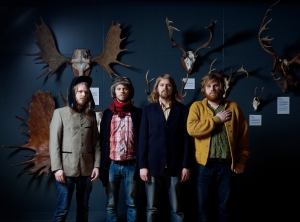During their first string of Brooklyn shows, Victor Vazquez and Himanshu Suri — better known as Das Racist — performed by plugging an iPod into a 1/8” cable and rapping over their only track, what was then a 20-minute ode to fast food chains. Amateur third-of-an-hour, indeed. “Combination Pizza Hut and Taco Bell,” the song in question, became a Williamsburg, NY, hit and soon a viral joke sensation in the summer of 2009. Everyone from hipsters to bros found solace in the cheesy (zing!) goodness of “Pizza Hut.” But these weird guys had no shot at a real rap rep, right?
Perhaps surprisingly, Das Racist’s bizarre, slurred approach to spittin’ rhymes and culturally topical, self-referencial lyrics have resurfaced this year with renewed vigor. The duo’s two recent mixtapes, “Shut Up, Dude” and “Sit Down, Man,” have received attention from the blogosphere, featuring guests El-P and Chairlift and production from the omnipresent Diplo. Their aesthetic has been called by The New York Times “as much a commentary on hip-hop as a rigorous practice of it.”
The group’s style has a tendency to polarize listeners. The band members themselves describe their vibe as “deconstructionist: sawing out the legs of hip-hop as they celebrate it.” Indeed, on tracks such as “hahahaha jk?” the band explores a series of non-sequiturs: a mix of references to “Days of Our Lives,” Dwight from “The Office,” live-action role-playing, 2-D movies, generally making dope rhymes and a mockery at the same time. On “I’m Up On That,” Das Racist sounds more Madvillain than ever, examining race through Queens’ riots, Reggie Bush and Hinduism — “brown man for dummies.”
When I saw Das Racist at a show for the College Music Journal Music Marathon, the band didn’t even play “Combination Pizza Hut and Taco Bell.” Apparently, they’ve attempted to distance themselves from the days of the 20-minute grease-heaven anthem. Yet somehow, the band has found a way to evolve: the show was a wild house party with legit lyricism, matched by their effervescent sense of humor.
—By Editor-At-Large Geoff Schorkopf











